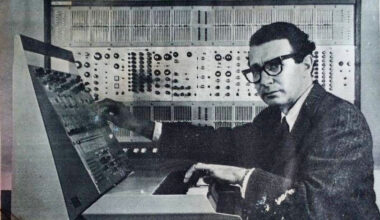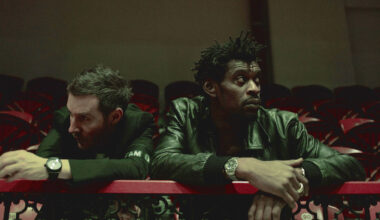Four years on from the acclaimed ‘English Electric’, Orchestral Manoeuvres In The Dark are preparing to release their difficult 13th album. It’s called ‘The Punishment Of Luxury’ and it’s full of surprises. Are you ready for a bit of bending?
“The music business is a selfish mistress,” declares Andy McCluskey. “It steals time off you, particularly at our age, when you’ve got kids and elderly parents who also need your attention. We’re lucky, though. We’re in a great position. It’s four years since our last album and we’ve been able to step back for a while. We spent a long time smelling the coffee and loving the people we love.”
It’s easy to forget to love the people we love. Which is why life has a habit of sending us little reminders. Or, in the case of Orchestral Manoeuvres In The Dark, a whopping great big reminder.
It happened in 2013, while they were touring their last album, ‘English Electric’. The record was received extremely positively – by both fans and critics – and the tour was pulling in good crowds when, completely out of nowhere, long-time OMD drummer Malcolm Holmes suffered a heart attack onstage during a gig in Toronto.
For Andy McCluskey and Paul Humphreys, who have known Malcolm since school, his muscial involvement going right back to proto-OMD bands Equinox and The Id, it was an earthquake-sized shock.
“To begin with, we weren’t quite sure what to do,” says Andy. “I mean, Malcolm survived, thank God he’s alive, but what happened to him made us stop and think, ‘Hmm, we need to get our work/life balance sorted out’.”
“We didn’t really do any music for about a year,” notes Paul. “We didn’t want to put any pressure on Malcolm, we wanted to give him a chance to recover, and like Andy says, we were lucky enough to be in a position to be able to step away from everything. After we released ‘History Of Modern’ in 2010, we questioned whether we wanted to make another album. The answer was yes, because we felt we still had something to offer, and the result was ‘English Electric’. The hiatus that followed Mal’s cardiac arrest prompted us to ask the question again… and we came up with the same answer.”
“It used to be album and tour, album and tour, pretty much every year,” sighs Andy. “We couldn’t do that now. We wouldn’t want to. As Paul says, we only want to release an album if we’ve got something to say and we’ve got an album’s worth of good material. If it takes a few years, then it takes a few years.”
We’re sitting in Paul Humphreys’ studio in west London, a neat space tucked away down an alley behind an inauspicious wooden gate on one of the capital’s most popular cut-through roads. You’d never find it unless you knew it was there. Paul has lived in London for many years now and his flat is a short walk from here. You can see the black shell of Grenfell Tower from his kitchen window.
Andy still lives close to Liverpool, Orchestral Manoeuvres In The Dark’s home city. He has a studio in his house, so the pair of them spend quite a lot of time travelling between the two places. They tried sending each other files over the internet when they started working on ‘History Of Modern’, which was the first album they’d recorded together since ‘The Pacific Age’ in 1986, but it wasn’t an especially fulfilling experience. For the group’s brand new album, ‘The Punishment Of Luxury’, which will be hitting the shops in early September, they’ve opted for a more traditional methodology, just as they did for ‘English Electric’.
Paul: “You can’t replace two guys sitting in a room going, ‘I’ve got this idea’ and ‘How about if you changed that chord?’ and ‘What if you changed that note?’.”
Andy: “When we write a melody, we write it together. Paul will start off with an idea and I’ll be downstairs making tea or something, and then I’ll run in and say, ‘That bit’s good, keep that bit, hang on, I’ll be back, I’ll just go and put your sugar in’. And then we’ll talk and we’ll say, ‘That next phrase isn’t so good, but the third phrase, that’s great, let’s move that up to second’. By the end of it, we don’t know who’s done what. Paul will be playing and I’ll be going, ‘Up, down, no, yes, yes, that one, keep that one’. And then he’ll play something different again and I’ll say, ‘That’s it, that’s better, we’ve got it now’.”
Paul: “That’s how we worked in the 1980s. That’s how we’ve always done it and you really can’t beat it.”
The geographical distance between them isn’t the only complication, though.
Andy: “When we started out in Paul’s mum’s back room, we’d lay down something for five minutes on the two-track, some drums and some bass, and then we’d just go over and over it. It meant that most of our songs were very linear. ‘Enola Gay’ and ‘Souvenir’ are the same chords all the way through.”
Paul: “We’d do five minutes of the same chords and then do variations on top. There was no other way to do it. You’ve got Pro Tools now, of course, so you can edit and change everything.”
Andy: “In the early days, it was like, ‘Bass?’, ‘Yes, I’ve got my bass guitar’. ‘Chord?’, ’Yes, Vox Jaguar organ’. ‘Melody?’, ‘Well, there’s the Selmer Pianotron or the synth that goes ‘Wheeerk!’. That was it. That was what we wrote songs with. Now it’s like, ‘Bass drum?’, ‘Sure, I’ve got 2,742 bass drums, which one do you want?’.”
Paul: “We call it the tyranny of choice. You’ve got so many possibilities, you can get utterly lost in it. Bass drum sounds are a particular problem. That’s what we argue about the most.”
I’m going to stick my neck out here. Nail my whatsit to the thingy. I’m going to proclaim ‘The Punishment Of Luxury’ as the best Orchestral Manoeuvres In The Dark album since ‘Organisation’ in 1980. And ‘Organisation’, as far as I’m concerned, is the best OMD album ever.

‘The Punishment Of Luxury’ is Andy and Paul’s third album since their reunion in 2006 and the 13th OMD album in all. It takes its title from an 1891 Giovanni Segantini painting that hangs in the Walker Gallery in Liverpool, which Andy says he’s loved since he was a teenager.
Another work of art, ‘La Mitrailleuse’ (‘The Machine Gun’) by First World War painter Christopher Nevinson, is the inspiration for one of the standout tracks. And still on the subject of art, the sleeve of the record, which was commissioned from Cheshire artist John Petch, is one of the most striking covers you’ll see this year.
Andy: “John Petch specialises in reducing urban landscapes down to graphics – shapes, angles, colour fields – so we were expecting something based on buildings, not based on two heads.”
Paul: “But we love it. Absolutely love it.”
Andy: “We’re expecting everyone to go, ‘Which one’s Andy and which one’s Paul?’, which will be quite entertaining.”
You don’t have to dig too deeply into ‘The Punishment Of Luxury’ to uncover an exceptional breadth of musical and lyrical vision. It really is a triumph on lots of levels. Several of the tracks have notably gritty and crunchy elements, creating a quite abrasive feel, and there are strong hints of electro and even glitch in with the synthpop. On top of that, Andy’s lyrics seem a bit angrier and a bit gloomier than we’ve come to expect from him.
Paul: “Parts of the album are probably more aggressive and darker than most of what we’ve done before.”
That said, just 20 seconds into the album, as the gigantic, coruscating, gorgeous melody of the title track surges in and soars upwards, there is no mistaking that this is an OMD record. It’s almost as if they can’t help themselves. They did the same with ‘Metroland’, the first song on ‘English Electric’.
Paul: “You’re right. We can’t divorce ourselves from our natural personal signatures, nor do we want to.
There’s a certain way that I do melodies, a certain way that Andy sings, a certain way that we put ideas together. I don’t know if I could describe it or analyse it, but whatever it is, we’ve definitely got it. And we know instinctively when we’ve got it right.”
Andy: “It does take longer now, but that’s inevitable after 13 albums. We’ll start with something and then we’ll go, ‘No, we’ve used that riff before’ or ‘No, that melody sounds like so-and-so’. We tortured ourselves about ‘One More Time’ on the new album because it fell together too easily. We thought it sounded like OMD too readily. We tried to deconstruct it over a period of about a year before realising we’d completely lost the feel of the track and went back to the original version from 12 months earlier.”
Two tracks that stand in stark contrast to both the harder and the poppier material are the ambient ‘Ghost Star’ and the melancholic ‘The View From Here’. The vocals and the orchestration of ‘Ghost Star’, the longest cut here, remind me of the wonderful ‘Stanlow’ from ‘Organisation’. ‘The View From Here’ is meanwhile almost crushingly sad. Interesting, the two tracks end the album.
Andy: “The lyrics of quite a few of the songs are me exploring some quite painful emotions and trying to find some sort of resolution where I can. In many ways, I think ‘Ghost Star’ and ‘The View From Here’ encapsulate the best that we do, in the sense that we use machinery, we sit here and everything comes out of the box, the only live elements are the vocals, and yet there is a humanity and an organic feel to our songs. That space between machinery on the one hand and humanity on the other is our default place. We fall back into it all the time.”
‘La Mitrailleuse’, the only words of which are “Bend your body to the will of the machine”, is a sharp reminder of the potentially brutal dehumanisation of mechanisation, but elsewhere the notion of “the machine” is explored in far more subtle ways, with the focus often on paradoxes and contradictions. There’s reduction through expansion (‘Isotype’) and regression through progression (‘As We Open So We Close’), for example. There’s also the concept of “the punishment of luxury” itself.
Andy: “It’s a metaphor for modern life. It’s about how we have substituted the imagined order of religion and religious decree for a new order of rampant consumerism in the Western world. Most people are materially better off than ever before, but it hasn’t made them happier.”
Paul: “Quite the reverse.”
Andy: “We’ve been brainwashed by marketing into believing that we’re not worthy of love, not worthy of respecting ourselves, unless we have the newest one, the biggest one, the fastest one. We’re bombarded by lifestyle statements. It’s all, ‘I need to look like this, my wife needs to look like that, I need wear these trainers, I need to drink this beer’. It’s all, ‘How many Likes have I got, how many retweets have I had?’. It’s all noise, all distraction. Because whatever you’ve got, there’s more depression and anxiety than when people spent 24 hours a day feeding their kids, trying to keep a roof over their heads, and hoping there wouldn’t be a war or a famine or a disease coming their way tomorrow. That’s the punishment of luxury.”
Sitting in a room with Andy and Paul for a couple of hours, it’s interesting to see how much they bounce off each other. They continually refer to each other and echo each other’s words and occasionally even finish each other’s sentences. I’m really not surprised they have to be in the same place at the same time to be able to make music.
I’ve read the two of you first met in primary school, is that right?
Paul: “Yes. We were seven.”
What’s your earliest memory of Andy?
Paul: “It was the first time we were on a stage together. We’d both been really naughty – I can’t remember what we’d done – and we were made to stand on stage together in the school hall while all the other kids had their lunch.”
Andy: “That’s my earliest memory of Paul too. We also both used to mime in our recorder groups at primary school, because we’d rather play football than learn recorder parts. We both used to make sure we sat on a table full of girls because they could play…”
Paul: “My mum kept my school report from my music teacher that said, ‘Paul Humphreys has no aptitude for music whatsoever’. She had it framed when the band became successful.”

Has your relationship changed over the years?
Paul: “I’d say it was better now than ever before. We’re a lot closer now than we used to be.”
Andy: “Yeah, I think that’s true. We occasionally drive each mad, though. We’ll sometimes pick up the phone to our manager and bitch about the other, but I know Paul has something I don’t possess myself just as he knows I have something he doesn’t possess. It’s the difference between us that makes OMD work.”
Can you explain what that difference is?
Andy: “I’m the butcher…”
Paul: “And I’m the surgeon.”
Andy: “I always go in with a grand plan. I try to paint a big picture and then I’ll say to Paul, ‘Can you see what it’s supposed to be? Good. Can you make it more like it’s supposed to be, please?’. Then when I come down here to hear his mix, I’ll walk in and say, ‘OK, a bit too much surgery. Can we undo some of the beauty and leave more of the edges?’. And then we’ll argue. With us, when it fits, it fits really well, but when it doesn’t, it’s a disaster. And we do sometimes get very angry with each other.”
Really? Properly very angry?
Paul: “We can do. But that’s just part of the creative process.”
If you weren’t in a band together, do you think you’d be friends?
Andy: “Hell no. He’s a Man United supporter.”
Paul : “Are you kidding me? He’s a Liverpool fan.”
Andy: “Just another way that we’re different. But we try to be kind to each other about it. If we’re independently watching the other’s team, we’ll be like, ‘Go on, stuff ’em, kick ’em, beat ’em, thrash ’em!’. And then if they do get beaten, we’ll text each other and say, ‘Sorry about that result there, you played so well, you were really unlucky’.”
So Paul, what’s the best thing about working with Andy?
Paul: “He has this incredible drive, he’s had it for as long as I’ve known him, and he’s one of my very favourite lyricists. He has a natural way with words that always resonates with me.”
And Andy, what’s the best thing about working with Paul?
Andy: “His understanding of technology and his sonic objectivity when it comes to mixing. I can’t mix my way out of a wet paper bag. I want everything to be as loud as everything else and I can’t place things at all. It’s the same on stage as well. I mean, I couldn’t do Paul’s job and I don’t think he could do mine. I couldn’t stand still and play keyboards. I only play keyboards in one song and I’ve only got three notes to play, but I usually get at least one of them wrong.”
What do you think Paul thinks is the worst thing about working with you, Andy?
Andy: “That I’m sometimes running too far ahead of where he’s at and we get disconnected because of that. I can be very impatient.”
Paul: “I’m keeping quiet.”
And what would you say Andy thinks is the worst thing about working with you, Paul?
Paul: “Probably that I have unrealistic expectations of time. I take a lot longer than I think I’m going to take and a lot longer than Andy wants me to. I get into a nerdy level of detail and it drives him crazy.”
Andy: “There’s the rest of the world time and then there’s Paul Humphreys time. With this new album, he’d been mixing for about three months and it was still going on and on and on. And then right at the end, he decided to start writing a new song. Which is another thing he does. He’s not finished the mix and he’s going, ‘Oh, it’s one minute to midnight, I think I’ll leave the mix and write a new song’.”
Andy puffs out his cheeks and slowly shakes his head. Paul shrugs and chuckles.
Paul: “But we’re always happy with where we get to in the end, aren’t we?”
Andy: “We are, but that’s because we’ve very cleverly learned to manage our own cognitive distortions and the other person’s cognitive distortions to the point where both of us think we’re in control of the other one.”
Next year is the 40th anniversary of Andy and Paul forming Orchestral Manoeuvres In The Dark. They’re very aware of the enormity of the occasion, so here’s hoping they will be planning one or two special events to celebrate. In the meantime, I ask them if the world in 2018 is going to be the way they imagined back in 1978?
“Not at all,” replies Paul. “I think we all thought we’d have flying cars by now and there would be no more wars, but I suppose they were more hopes than realistic predictions. Then again, I was a huge fan of ‘Star Trek’ as a kid and I remember desperately wanting one of the communicators…”
He nods to his mobile phone on the mixing desk beside him.
“Yeah, imagine if you could talk to someone on the other side of the world without a wire,” laughs Andy. “But it’s the small stuff that tends to happen rather than the big stuff, isn’t it? Mind you, I do think we’re at a tipping point now in terms of robotics. When is ‘Blade Runner’ set? Is it 2023?”
“Err, I think it’s 2019,” says Paul. “Oh my God.”
“Well, we’ve got LED screens everywhere and the weather’s pretty fucked up…”
“And the big multinational corporations are running the world,” adds Paul.
“It’s frightening how national politicians are increasingly less and less important,” says Andy. “They’re like Maggie Simpson with her plastic steering wheel. They think they’re in charge of the car, but they’re not the ones making the decisions. It’s the big companies that are doing that.”
Which brings us back to the idea of the punishment of luxury. And as the corporations gain ever more control, it’s most likely only going to get worse. Is there a way out?
“I think you have to consciously step back from it,” says Andy. “ You have to make a decision to disconnect from it. Well, you have to try anyway. It’s really important that everyone buys the new OMD album before they do that, though. And make sure you get the special edition because the standard album is for losers!”
‘The Punishment Of Luxury’ is released by 100% Records






